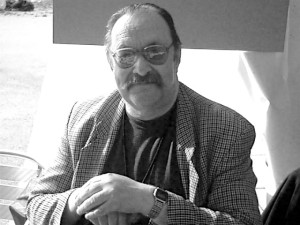
It is with great sadness that we have to announce that Lev Tcherenkov (Cherenkov), a friend, a scholar, with whom we worked for the last 24 years recently passed away. Born on October 12th, 1936 originally from Lithuania, he passed away after a long illness on April 16th, 2016 in Moscow. He is survived by his wife and his son.
Syr baganas phure Lotfitke Roma:
Bušulime sam amen ke amaro amal Lev Čerenkov mulas ande Moskva ando Aprilo. Te avel o drom angla leste puterdo! Sar gilabenas phure Lotfitke Rroma:
Xačkir jaga.
Me kana zaraz,
Zaraz merava.
Kedi me merava,
Šun so phenava,
Ke trudnes man po grobus
Na janen.
Bet ku mu grobus
Gren kheljakiren.
U vini pjen
Te šljanki phagiren.
Light fires.
Now, immediately.
Innediately, I’ll die.
When I’ll die,
Listen to what I say.
With sorrow, to my grave
Don’t bring me.
But on my grave
Let the horse dance
Drink wines
And break the glasses.
Lev worked all his life with and for Rroma. Himself a Rrom (Litovsko) he was one of the best specialists on Rromanes and published numerous articles and a few books. Besides all dialects of Rromanes, he also spoke most European languages and a few beyond. He initially studied at Moscow University and he lastly works as a senior researcher in the Russian Institute for the preservation of the cultural and natural heritage in Moscow, and was the institute’s specialist for Rroma and their culture. He was member of the board of the Rroma Foundation from 1992 until 2005, and continued to work for the Foundation until his death. He also had long lasting cooperation with Romano Centro in Austria and with Moses Heinschink especially, as well as with the Institute of Language Science of the University of Graz, especially with Prof. Dieter Halwachs.He was a pioneer in using the language, Rromanes, as a source of history and as a tool to trace the migration of the Rroma from India to Europe. His historical linguistic theories were vindicated by more recent means in several genetic studies telling the same story: Rroma have been in Europe for over a thousand years, are all from the very same migration, and have remained remarkably united in spite of having spread all over the continent.
We sincerely grieve the loss of a friend, a scholar, and a wonderful man.